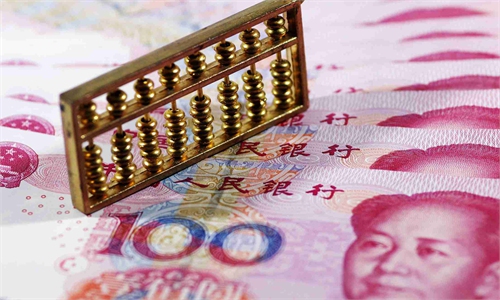Promoting high-level financial opening-up while ensuring China’s national financial security

Shanghai Photo:VCG
The central financial work conference held in Beijing in October called for accelerating the building of the nation with a strong financial sector, elevating the importance of financial work in China's national economy to an unprecedented level. Financial work has long occupied a significant position in the Chinese economy. Preventing financial risks has also become an important component of the national security strategy.
China has basically established a multi-level financial system that serves all aspects of the society and economy. Finance should support technological innovation, common prosperity, structural transformation, and green development, as well as support China's economic integration into globalization and advancing the cooperation of the Belt and Road Initiative (BRI).
Given China's position as the world's second-largest economy and its integration with the global economy, the Chinese economy and finance face additional risks stemming from international economic fluctuations, the spillover effects of economic policies implemented by other countries, and shifts in international geopolitical dynamics. Consequently, the focus of finance has expanded beyond traditional domestic operations. In light of these circumstances, it is imperative for China to step up its efforts in becoming a strong financial power.
The strength of finance is reflected in its ability to support social and economic development and its ability to prevent risks. Expediting efforts to build a strong financial power requires greater reform efforts.
To begin with, it is necessary to streamline the relationship between macroeconomic regulation and financial supervision, and establish a comprehensive financial regulatory system.
The functions and organizational structure of the central bank, which is responsible for macroeconomic regulation, macroprudential management and monetary policy, need to be clarified. The National Administration of Financial Regulation and the China Securities Regulatory Commission's regulation should leave no regulatory gaps or blind spots to prevent regulatory arbitrage and illegal financial activities. Local Party committees need to establish financial commissions and financial work commissions, and local government financial regulatory bureaus need to be responsible for regulatory functions, strengthening local responsibility for preventing financial risks.
China needs to continue improve its financial system. This includes improving the financial infrastructure system, the financial market system, and the financial institution system, among others. China can strengthen large-scale financial institutions. With the development of technology and the globalization of industrial and supply chains, financial services have become increasingly networked, scaled, and institutionalized, especially in the context of intense international geopolitical competition.
The meeting has identified that technology finance, green finance, inclusive finance, pension finance, and digital finance are the main directions for financial innovation and services in the future. These five aspects are the specific focus of financial services which are connected to the real economy.
These five aspects are comprehensive and forward-looking, and they are actually the direction for China's high-quality economic development. China needs to focus on technological innovation, the market-oriented application of technology, green development, common prosperity, the needs of an aging society in the future, and the digital economic development model.
China needs to continue vigorously promoting high-level opening-up in the financial sector to ensure national financial and economic security. The statement of this conference to "enhance the competitiveness and influence of Shanghai as an international financial center and consolidate and enhance the status of Hong Kong as an international financial center" is particularly noteworthy.
Financial opening-up is different from that of other industries. The opening-up of the financial industry requires not only corresponding institutional maturity, but also the establishment of sound infrastructure, abundant financial instruments and products, and active trading markets as intermediaries, which are represented by international financial centers.
High-level financial openness is inevitably two-way, which needs to be achieved through the establishment of international financial centers. Cross-border finance and the transmission of economic risks generally spread through international financial centers. Therefore, the construction of international financial centers is not only a requirement for open development, but also a need to ensure national financial and economic security.
The requirement to enhance the competitiveness and influence of Shanghai as an international financial center is both inward and outward-oriented. While attracting foreign investment, it is necessary to support Chinese companies going global, support the integration of the Chinese economy into the process of globalization, support BRI cooperation, and support the steady and prudent promotion of the internationalization of yuan.
Specifically, Shanghai's role as an international financial center should be represented as the international financial center for the Chinese yuan - a cross-border settlement center, an international investment and financing center for the yuan, an international trading center for yuan assets, and a pricing center for yuan assets. A competitive and influential international financial center is an important indicator of a strong financial power.
Hong Kong, as a well-established international financial center, needs to further enhance its functions in the financial sector. Hong Kong's role as a bridge was mainly focused on attracting foreign investment into China, which was a one-way flow. In the future, the bridge function of Hong Kong as an international financial center should be two-way, serving as a bridge not only for foreign capital entering China but also for Chinese capital going global.
With further high-level opening-up, China's economy and finance are expected to be influenced by various factors such as intensified international geopolitical conflicts, fluctuations in the global economy, and changes in foreign macroeconomic policies. It is crucial for China to consider both domestic and international conditions, as well as the potential impacts they may generate, when formulating macroeconomic policies and determining the appropriate timing for policy implementation.
The conference highlighted the importance of preventing and defusing financial risks. Currently, China faces financial risks in the real estate industry, hidden debts of local governments, risks in certain small and medium-sized financial institutions, and the risks associated with financial crimes and corruption. In addition to the measures and principles mentioned in the top financial meeting, relevant departments have recently introduced more specific measures to tackle these risks.
The author is vice president of the Shanghai Finance Institute. bizopinion@globaltimes.com.cn



